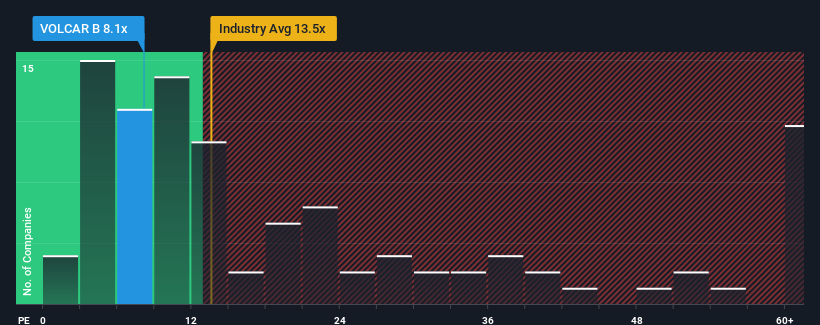The Market Lifts Volvo Car AB (publ.) (STO:VOLCAR B) Shares 29% But It Can Do More

Volvo Car AB (publ.) (STO:VOLCAR B) shares have had a really impressive month, gaining 29% after a shaky period beforehand. Unfortunately, the gains of the last month did little to right the losses of the last year with the stock still down 25% over that time.
Even after such a large jump in price, Volvo Car AB (publ.) may still be sending very bullish signals at the moment with its price-to-earnings (or "P/E") ratio of 8.1x, since almost half of all companies in Sweden have P/E ratios greater than 21x and even P/E's higher than 40x are not unusual. Although, it's not wise to just take the P/E at face value as there may be an explanation why it's so limited.
Volvo Car AB (publ.) hasn't been tracking well recently as its declining earnings compare poorly to other companies, which have seen some growth on average. It seems that many are expecting the dour earnings performance to persist, which has repressed the P/E. If you still like the company, you'd be hoping this isn't the case so that you could potentially pick up some stock while it's out of favour.
View our latest analysis for Volvo Car AB (publ.)

What Are Growth Metrics Telling Us About The Low P/E?
There's an inherent assumption that a company should far underperform the market for P/E ratios like Volvo Car AB (publ.)'s to be considered reasonable.
Retrospectively, the last year delivered a frustrating 16% decrease to the company's bottom line. Still, the latest three year period has seen an excellent 92% overall rise in EPS, in spite of its unsatisfying short-term performance. Accordingly, while they would have preferred to keep the run going, shareholders would probably welcome the medium-term rates of earnings growth.
Shifting to the future, estimates from the nine analysts covering the company suggest earnings should grow by 25% per year over the next three years. With the market only predicted to deliver 19% per annum, the company is positioned for a stronger earnings result.
With this information, we find it odd that Volvo Car AB (publ.) is trading at a P/E lower than the market. Apparently some shareholders are doubtful of the forecasts and have been accepting significantly lower selling prices.
What We Can Learn From Volvo Car AB (publ.)'s P/E?
Even after such a strong price move, Volvo Car AB (publ.)'s P/E still trails the rest of the market significantly. We'd say the price-to-earnings ratio's power isn't primarily as a valuation instrument but rather to gauge current investor sentiment and future expectations.
We've established that Volvo Car AB (publ.) currently trades on a much lower than expected P/E since its forecast growth is higher than the wider market. There could be some major unobserved threats to earnings preventing the P/E ratio from matching the positive outlook. At least price risks look to be very low, but investors seem to think future earnings could see a lot of volatility.
We don't want to rain on the parade too much, but we did also find 2 warning signs for Volvo Car AB (publ.) that you need to be mindful of.
If these risks are making you reconsider your opinion on Volvo Car AB (publ.), explore our interactive list of high quality stocks to get an idea of what else is out there.
If you're looking to trade Volvo Car AB (publ.), open an account with the lowest-cost platform trusted by professionals, Interactive Brokers.
With clients in over 200 countries and territories, and access to 160 markets, IBKR lets you trade stocks, options, futures, forex, bonds and funds from a single integrated account.
Enjoy no hidden fees, no account minimums, and FX conversion rates as low as 0.03%, far better than what most brokers offer.
Sponsored ContentNew: Manage All Your Stock Portfolios in One Place
We've created the ultimate portfolio companion for stock investors, and it's free.
• Connect an unlimited number of Portfolios and see your total in one currency
• Be alerted to new Warning Signs or Risks via email or mobile
• Track the Fair Value of your stocks
Have feedback on this article? Concerned about the content? Get in touch with us directly. Alternatively, email editorial-team (at) simplywallst.com.
This article by Simply Wall St is general in nature. We provide commentary based on historical data and analyst forecasts only using an unbiased methodology and our articles are not intended to be financial advice. It does not constitute a recommendation to buy or sell any stock, and does not take account of your objectives, or your financial situation. We aim to bring you long-term focused analysis driven by fundamental data. Note that our analysis may not factor in the latest price-sensitive company announcements or qualitative material. Simply Wall St has no position in any stocks mentioned.
About OM:VOLCAR B
Volvo Car AB (publ.)
Designs, develops, manufactures, assembles, and sells passenger cars in Sweden and internationally.
Solid track record with excellent balance sheet.


